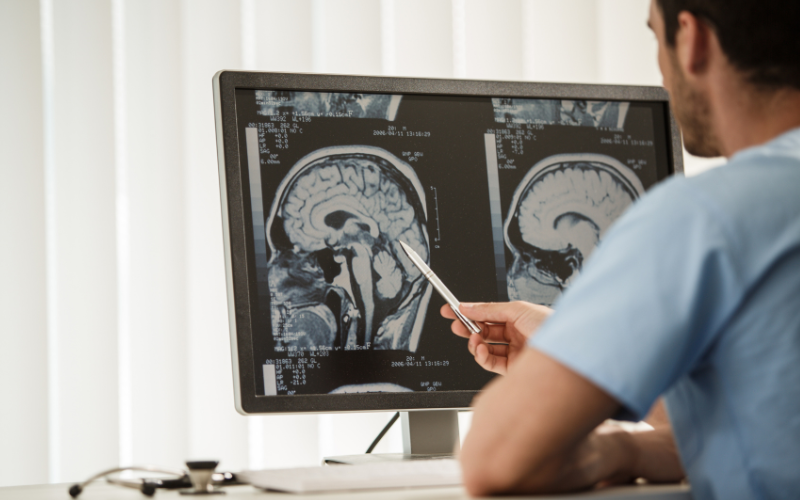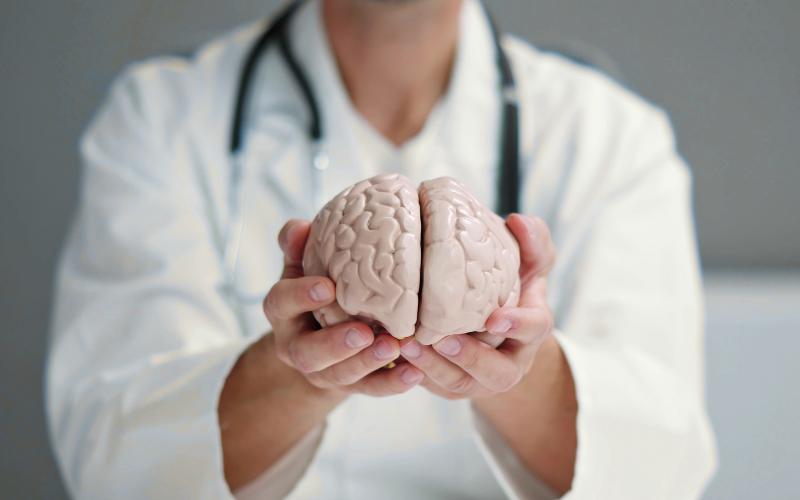10 Surprising Brain Changes After 40 You Must Know!

REVIEWED BY Dr. Rajinder Kumar (Neurosurgeon) on 9 may 2025.
“Where did I keep my glasses?”, “What was I just saying?”, “I know that face, but the name… It’s on the tip of my tongue!”
Sound familiar? If you’ve found yourself or your loved ones saying this more often, you’re not alone. As we grow older, these tiny lapses in memory or focus can feel frustrating or even scary. Many of us begin to wonder: Is this just normal aging, or something serious like dementia?
Here’s the truth: Not every forgetful moment is a red flag. The brain, like the rest of the body, goes through natural changes as we age. Some are normal, some need attention, but all are better understood when explained in simple terms.
In this blog, I’ll break down the effects of aging on the brain, what’s expected, what’s not, and when you should consider professional help. I’ll also share science-backed tips to keep your mind sharp, plus how to support aging parents or loved ones.
Let’s decode the aging brain together.
What Happens to the Brain as We Age?

As we get older, it’s not just the hair that turns grey, our brain goes through changes too. But don’t worry, most of these shifts are part of the natural process.
Think of your brain like a supercomputer. Over time, its processing speed might slow down a bit. You may need a few extra seconds to remember a word or process new information. That’s totally normal.
What’s really happening?
- The brain shrinks slightly in volume, especially in areas related to learning and memory.
- Communication between brain cells may become a little slower.
- Blood flow in the brain can be reduced, which may affect focus and clarity.
- Brain chemicals (called neurotransmitters) also decrease, which may impact mood and memory.
These changes don’t mean your brain is failing; they just mean it’s aging, like the rest of your body.
Ready to see how aging is different from an actual brain disease? Let’s break it down next.
Difference Between Brain Aging and Brain Disease

Okay, here’s the million-rupee question:
Is forgetfulness just age, or is it something more serious?
Let’s set the record straight. Aging and brain diseases are not the same. Just like getting tired easily with age doesn’t mean you have a heart problem, a slower brain doesn’t always mean dementia.
Brain Aging = Natural
It happens to everyone. It’s slow, gentle, and usually doesn’t affect your daily life too much. You might forget where you left your phone, but you can still retrace your steps and find it.
Brain Disease = Medical Condition
This includes things like Alzheimer’s or other types of dementia. These conditions interfere with your ability to live independently. They get worse over time and require medical help.
Let’s make it even simpler:
| Feature | Brain Aging | Brain Disease (e.g., Dementia) |
| Memory Lapses | Occasional, like misplacing keys | Frequent, like forgetting close family |
| Thinking Speed | Slightly slower | Confused, trouble making decisions |
| Daily Activities | Mostly unaffected | Struggles with cooking, dressing, etc. |
| Language | Occasional word-finding issues | Trouble forming full sentences |
| Awareness | Usually aware of memory slips | Often unaware of memory loss |
Knowing the difference can save you from unnecessary panic or help you catch problems early.
Now let’s explore 10 effects of aging on the brain, in everyday terms you can actually understand.
10 Effects of Aging on the Brain
As we grow older, the brain doesn’t stay the same, but not all changes are scary. Let’s look at the 10 most common effects of aging on the brain, explained in a way anyone can understand.
1. Slower Information Processing

Ever met someone at a wedding, and five minutes later, forgot their name?
That’s your brain taking a little longer to process and store new info. It’s like an old computer, still works, just not at lightning speed.
When to worry and when not to:
- Don’t worry if: You remember things later, especially with a hint or context.
- Worry if: You frequently forget names, places, or conversations, even after reminders.
2. Memory Decline (Especially Short-Term)
Short-term memory helps you remember what you just ate or where you parked. Aging can make this a bit fuzzy.
Early memory lapses:
- Forgetting where you left the remote
- Repeating a story once or twice
Dementia warning signs:
- Forgetting familiar routes or faces
- Asking the same question over and over
- Getting confused with time or place
3. Decreased Attention Span

Find it harder to stay focused on one thing? That’s not laziness, it’s your brain aging.
As we grow older, the brain struggles more with multitasking or tuning out distractions. It’s like trying to read in a noisy market.
4. Shrinkage of Brain Volume
Yes, the brain actually gets smaller with age, but not in a scary way.
It’s like a sponge that dries out a bit. Mostly, areas that handle learning and memory are affected, which explains some of those “senior moments.”
5. Reduced Neuroplasticity

Neuroplasticity is your brain’s ability to learn and adapt. With age, this slows down but doesn’t stop.
It may take longer to learn new skills, but it’s still possible! So yes, your dad can still learn how to use Instagram; it might just take a few tries.
6. Changes in Sleep Patterns
Older adults often sleep less or wake up more during the night. This isn’t always a problem, but it can affect focus and mood.
Why? The brain makes less melatonin (the sleep hormone), and its internal clock changes a bit with age.
7. Emotional Processing Shifts

Seniors may become more emotional or sensitive. Tears might come quicker, or they may get upset more easily.
This happens because brain areas handling emotion react differently with age. It’s not weakness, it’s just change.
8. Decline in Reflexes and Coordination
Ever noticed your dad taking longer to react when catching a ball?
Aging affects how fast the brain sends signals to the body, which means slower reflexes and sometimes, poor balance.
9. Language & Communication Challenges

Sometimes older adults know what they want to say, but can’t find the word. That’s normal.
As long as they eventually recall it, it’s fine. But if they start struggling with full sentences or using wrong words often, it needs a closer look.
10. Increased Risk of Cognitive Disorders
With age, the risk of brain disorders like Mild Cognitive Impairment (MCI) or Alzheimer’s increases.
- MCI: Slight but noticeable memory problems. You can still live independently.
- Alzheimer’s: A brain disease that causes severe memory loss, confusion, and behavior changes. Needs medical care.
When to See a Neurologist?

Not every memory lapse means something is wrong. But sometimes, small changes can be the early signs of something bigger. Knowing when to seek expert help can make a world of difference.
Normal Age-Related Changes
These are harmless and happen to almost everyone.
- Occasionally forgetting names or appointments
- Taking longer to learn something new
- Sometimes losing focus or needing reminders
- Slower reaction time, but still safe and functional
Signs of Serious Cognitive Decline
These changes are not normal and need medical attention.
- Getting confused about time, place, or people
- Repeating the same question multiple times
- Difficulty in completing everyday tasks like cooking or dressing
- Losing the ability to manage finances or medications
- Sudden mood swings or personality changes
If you or a loved one is showing any of these signs, it’s time to consult a neurologist.
Brain Aging: What Makes It Unique?

Aging affects everyone, but the brain has its own story. Unlike your bones or skin, your brain is shaped not just by age, but also by your lifestyle, environment, and emotions.
Scientific Explanation in Simple Words
As we age, the brain loses a bit of volume and slows down the way it processes information. Think of it like an old, wise tree; it may not sway fast in the wind, but its roots run deep.
Indian Lifestyle, Stress & Family Systems
In India, aging brains often face a mix of tradition and tension. Elders may stay mentally active in joint families, but modern stress, noise, and expectations can take a toll. Emotional burdens like feeling “left out” or “useless” can silently harm brain health.
Diet, Habits & Mental Health Stigma
We love our ghee, pickles, and chai, but not all our habits are brain-friendly. Also, talking about “mental problems” is still taboo in many homes. Many seniors hide memory issues out of fear or shame, delaying diagnosis and help.
Urban vs Rural, Brain Health Challenges
In cities, seniors might feel isolated despite the crowd, fewer connections, and more screens. In villages, there’s community bonding, but a lack of awareness and access to doctors. Both sides have unique brain aging challenges.
How to Slow Down Brain Aging: 7 Simple Tips

The brain might age, but we can help it age better. Just like a car runs longer with regular care, your brain stays sharper with the right habits.
Here are 7 simple ways to keep your mind young and alert:
1. Challenge Your Brain
Play games, solve puzzles, read books, or learn something new, even a new recipe or language.
2. Eat Brain-Friendly Foods
Include omega-3 rich foods like fish, walnuts, and Indian superfoods like turmeric and amla.
3. Move Your Body
Exercise increases blood flow to the brain. Even a daily 30-minute walk helps more than you think.
4. Prioritize Sleep
Quality sleep helps your brain clean up toxins and recharge memory centers.
5. Stay Social
Talk to friends, spend time with family, or join community groups. Loneliness ages the brain faster.
6. Manage Stress
Practice deep breathing, meditation, or even simple “me time.” Stress kills brain cells faster than age.
7. Get Regular Check-ups
Catching small issues early can prevent big ones later. Don’t skip those doctor visits!
Caring for Aging Parents

Watching your parents grow older is emotional. They once took care of everything, and now, they may need your help remembering small things. It’s a full-circle moment, and it needs more heart than judgment.
Start with Understanding, Not Judgement
It’s easy to get irritated when they forget something or repeat a story. But remember, they’re not doing it on purpose. Patience is the new love language. Listen more, correct less. A little empathy goes a long way.
Encourage Routine & Brain Engagement
Help them build a predictable daily schedule of meals, walks, hobbies, and prayers. Encourage crosswords, storytelling, or helping grandkids with homework. Mental stimulation isn’t just fun—it’s powerful.
Help with Medication, Diet, and Doctor Visits
Keep track of their medicines, guide them on a brain-healthy diet, and accompany them for regular check-ups. Make doctor visits less about “problems” and more about “prevention.” Your involvement can boost their health and confidence.
Frequently Asked Questions
Q1. Is memory loss inevitable with age?
Mild memory lapses are normal as we age, like forgetting names or misplacing things. But serious memory loss is not normal and should be checked by a doctor.
Q2. At what age do brain changes begin?
Brain changes can start as early as your 30s or 40s, but they become more noticeable after 60. Lifestyle choices can delay these effects.
Q3. Can brain aging be reversed?
Brain aging can’t be reversed completely, but regular mental and physical activity can slow it down. The earlier you start, the better the results.
Q4. What foods slow down brain aging?
Foods rich in omega-3s and antioxidants, including Indian superfoods like turmeric, almonds, and amla, help protect brain cells. A balanced diet supports brain health.
Q5. How is brain aging different from dementia?
Brain aging causes slow, manageable changes, while dementia leads to severe memory loss and confusion. Dementia is a medical condition that needs treatment.
Struggling with same?
Book Your Appointment With Our Expert Doctors

Conclusion
Aging is natural, but suffering in silence isn’t. The brain may change with time, but how we respond makes all the difference.
Understanding the difference between normal aging and warning signs can help you catch problems early, and that’s powerful. Whether it’s your parent forgetting where they kept the sugar or you taking longer to recall a name, know that there’s help, hope, and healing available.
Let’s make brain health a family habit, not a hidden fear.
If you’ve noticed unusual changes in memory, behavior, or thinking, don’t wait for it to get worse. Raja Hospital’s trusted neurologists are here to help with expert diagnosis, early intervention, and personalized care.
Book your consultation today and take the first step towards clarity and peace of mind.
